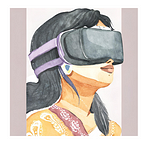From Nervous Novices to Clinical Conquerors ?
*Shudders* My mental image of drawing blood in labs and clinics is always so gruesome. I have been pricked multiple times by trainees in hospitals to find the right vein for extraction. For a person who is scared of needles and faints at the sight of blood, these experiences have been mostly traumatising.
On the first day of my work at MediSim VR, I was given a demo of the platform they developed and deployed for several medical schools. One of the initial modules I was exposed to was the blood collection module and trust me when I say, I was so immersed in learning and remembering the process that any inhibition I had with blood collection disappeared. This got me curious about actual healthcare practising learners, and how much their efficiency and confidence could increase upon going through MediSim VR’s modules.
On our next visit to one of MediSim VR’s three functioning labs in Southern India, I learnt that my team received feedback on how engaging the model was and how a lot of students claimed an increase in confidence to handle real-life clinical experiences and patients because of the different situations they encountered in the learning modules. One of them had a similar issue to mine, with respect to witnessing blood, and they were glad to have witnessed the animated blood before they were exposed to the real deal.
Does this mean that VR can enhance patient outcomes by creating a smoother experience in clinics as the trainees gain confidence virtually? Here’s what I learned from a lot of research and data I came across:
Sharper with VR: I learnt that medical students who received VR training did better than their peers in traditional training methods (Nearly 230–300% improvement). This proves that VR helped students practice procedures repeatedly, helping them build muscle memory and confidence in their abilities.
Zen-Mode Activated: I’ve read that VR can desensitise students to the anxiety-inducing aspects of clinical practice. (Nearly 70% of students using our VR module felt that way) The exposure to real-life situations in a virtual environment can help students overcome their fears, just as I did with my fear of blood collection.
Right Decisions at Right Time: VR modules provide students with a platform to make critical decisions in real time. Getting their hands dirty virtually helps them refine their decision-making skills, which are crucial in medical practice. It also allows them to experience a wide range of scenarios, from routine procedures to complex emergencies.
Patient Safety: When students are more confident and skilled, patient safety improves. VR training can reduce errors and mishaps in real clinical settings, ultimately benefiting the well-being of patients. (A few research papers say a 20–30% reduction in errors, which is still amazing!!)
Simply put, VR helps trainees get the opportunity to hone their skills, gain confidence, and ultimately ensure that patients receive better care.
As I reflect on my experience using MediSim VR’s module and the positive impact it had on my own fear of blood, I can’t help but believe that this type of training can produce remarkable outcomes for both doctors and patients. It’s not just about conquering fears; it’s about being confident, competent, and compassionate in whatever is being learnt. So if you want you or your students to be less traumatised in learning, and more equipped, while spending less time and money, book a demo here ;)
